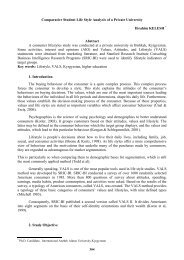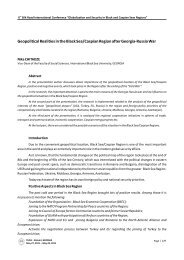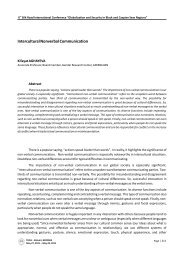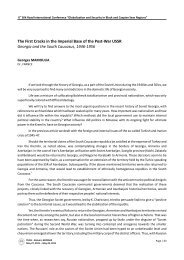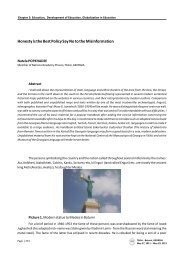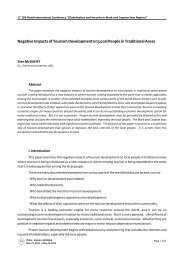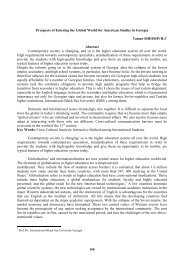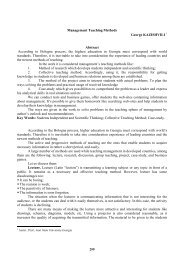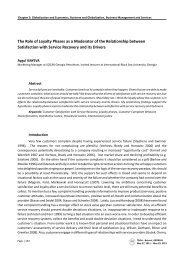Sevdagul ALIYEVA, Cultural Relations of the Azerbaijan Republic at ...
Sevdagul ALIYEVA, Cultural Relations of the Azerbaijan Republic at ...
Sevdagul ALIYEVA, Cultural Relations of the Azerbaijan Republic at ...
- No tags were found...
Create successful ePaper yourself
Turn your PDF publications into a flip-book with our unique Google optimized e-Paper software.
Chapter 4: Tourism Development, Culture and <strong>Cultural</strong> Identity, Cross-<strong>Cultural</strong> <strong>Rel<strong>at</strong>ions</strong>hips<strong>Cultural</strong> <strong>Rel<strong>at</strong>ions</strong> <strong>of</strong> <strong>the</strong> <strong>Azerbaijan</strong> <strong>Republic</strong> <strong>at</strong> <strong>the</strong> Modern Time<strong>Sevdagul</strong> <strong>ALIYEVA</strong>Dr, Head <strong>of</strong> Regional Studies Department <strong>of</strong> <strong>Azerbaijan</strong> University <strong>of</strong> Languages, AZERBAIJANAbstract<strong>Azerbaijan</strong> situ<strong>at</strong>ed in <strong>the</strong> crossroad between East and West summed up various values <strong>of</strong> world civiliz<strong>at</strong>ion,moreover, made a major contribution to treasures <strong>of</strong> world culture, educ<strong>at</strong>ion and science. Fur<strong>the</strong>rmore, <strong>the</strong> ancientn<strong>at</strong>ional culture <strong>of</strong> <strong>Azerbaijan</strong> enhanced through associ<strong>at</strong>ing with world civiliz<strong>at</strong>ion. This is n<strong>at</strong>ural just because culture <strong>of</strong>all n<strong>at</strong>ions couldn't exist without communic<strong>at</strong>ing with or isol<strong>at</strong>ing from all <strong>the</strong> o<strong>the</strong>r cultures <strong>of</strong> <strong>the</strong> world. Therefore,n<strong>at</strong>ional culture should enrich through <strong>the</strong> achievements <strong>of</strong> <strong>the</strong> world and should be beneficial for whole mankind. Today<strong>the</strong> geography <strong>of</strong> <strong>Azerbaijan</strong>i cultural rel<strong>at</strong>ions is also being expanded, and gets new forms and shapes. Although a lot <strong>of</strong>works should be done for better introducing our culture to world. It is pity th<strong>at</strong> <strong>Azerbaijan</strong> is still known for its Oil andNagorno Karabakh problem, not for our rich cultural heritage. The pearls <strong>of</strong> our cultural heritage in better way can beconsidered as a sample <strong>of</strong> Islam culture and <strong>the</strong> world community does not get inform<strong>at</strong>ion about <strong>the</strong> exact possessors <strong>of</strong>this culture. The worse situ<strong>at</strong>ion is th<strong>at</strong> Armenians are not s<strong>at</strong>isfy with <strong>the</strong> occup<strong>at</strong>ion <strong>of</strong> our territory, but also <strong>the</strong>ypretend to possess our cultural and historical monuments, music, poet pearls <strong>of</strong> <strong>Azerbaijan</strong> to <strong>the</strong>ir own.The gre<strong>at</strong> scientific and technological revolutions <strong>of</strong> <strong>the</strong> XX century gave a new impetus for <strong>the</strong>understanding <strong>of</strong> <strong>the</strong> world and rel<strong>at</strong>ions between n<strong>at</strong>ure and humans. Consequently, <strong>the</strong>se revolutions ledconflicts between st<strong>at</strong>es, so <strong>the</strong> result <strong>of</strong> integr<strong>at</strong>ion process among different n<strong>at</strong>ions is getting more pr<strong>of</strong>ound,and becoming a new impetus for <strong>the</strong> Development <strong>of</strong> World Policy.At <strong>the</strong> beginning <strong>of</strong> <strong>the</strong> 90th <strong>of</strong> XX century <strong>the</strong> collapse <strong>of</strong> Soviet Union has shifted <strong>the</strong> world’s politicalmap. The recently emerged geographical-political units began to integr<strong>at</strong>e actively to world’s political system.The South Caucasus was one <strong>of</strong> <strong>the</strong> territories which could <strong>at</strong>tract <strong>the</strong> <strong>at</strong>tention <strong>of</strong> world policy. The geopoliticalprocesses which are going on in this territory directed <strong>the</strong> <strong>at</strong>tention <strong>of</strong> world and regional countries to<strong>the</strong> pressing policy <strong>of</strong> South Caucasus. The <strong>Republic</strong> <strong>of</strong> <strong>Azerbaijan</strong> is <strong>the</strong> potential country from its cultural andeconomic aspects. The leading countries <strong>of</strong> <strong>the</strong> world have accepted <strong>Azerbaijan</strong> as <strong>the</strong> leader country <strong>of</strong> SouthCaucasus. <strong>Azerbaijan</strong> tries to gain <strong>the</strong> balanced position in world policy. It has been determined <strong>the</strong> priorities <strong>of</strong>world policy by <strong>the</strong> realiz<strong>at</strong>ion <strong>of</strong> economic, democr<strong>at</strong>ic, social-cultural reforms (Xudiyev, 2011).Along with <strong>the</strong> o<strong>the</strong>r factors <strong>the</strong> place and <strong>the</strong> role <strong>of</strong> each country in <strong>the</strong> Intern<strong>at</strong>ional Rel<strong>at</strong>ion systemis being determined with <strong>the</strong> resources <strong>of</strong> foreign policy. Relying on <strong>the</strong>se resources <strong>the</strong> st<strong>at</strong>es conduct <strong>the</strong>irpolicy and act in an adequ<strong>at</strong>e way in <strong>the</strong> world arena.<strong>Azerbaijan</strong> possesses geographical, economic, military-political, social-democr<strong>at</strong>ic resources and richcultural moral potential. The cultural-ideological potential, <strong>the</strong> academic and intellectual level <strong>of</strong> popul<strong>at</strong>ionmake our country occupy leading places in <strong>the</strong> world. The most valuable treasure <strong>of</strong> each country is its culturalPage | 232Tbilisi - B<strong>at</strong>umi, GEORGIAMay 27, 2011 – May 29, 2011
th6 Silk Road Intern<strong>at</strong>ional Conference “Globaliz<strong>at</strong>ion and Security in Black and Caspian Seas Regions”and moral values.Through <strong>the</strong> ages <strong>Azerbaijan</strong> is situ<strong>at</strong>ed on <strong>the</strong> cross roads <strong>of</strong> East and West. <strong>Azerbaijan</strong>’s ancientcultural history which summoned <strong>the</strong> advanced values <strong>of</strong> world civiliz<strong>at</strong>ion and <strong>at</strong> <strong>the</strong> same time made itscontribution to world’s cultural, scientific educ<strong>at</strong>ion treasure became richer via <strong>the</strong> development <strong>of</strong> contactwith world n<strong>at</strong>ion’s culture. The main and important duty which stands before <strong>Azerbaijan</strong> st<strong>at</strong>e and n<strong>at</strong>ion is topreserve, enrich <strong>the</strong>se n<strong>at</strong>ional and cultural values and convey <strong>the</strong>m to future gener<strong>at</strong>ions. With <strong>the</strong>se aims alllevel <strong>of</strong> <strong>the</strong> cre<strong>at</strong>ive and constructive activities should be propag<strong>at</strong>ed, <strong>the</strong> main importance has to be given to<strong>the</strong> invention, direction and appreci<strong>at</strong>ion <strong>of</strong> new abilities (Abbasov N., 2009)Today intern<strong>at</strong>ional cultural rel<strong>at</strong>ions have become <strong>the</strong> main field <strong>of</strong> Intern<strong>at</strong>ional <strong>Rel<strong>at</strong>ions</strong> and thishas led main factor for protection <strong>of</strong> stability and security in <strong>the</strong> world, for streng<strong>the</strong>ning <strong>the</strong> solidarity amongn<strong>at</strong>ions and mutual trust and confidence.In 1991 <strong>Azerbaijan</strong> <strong>Republic</strong> after getting its independence determined <strong>the</strong> main priorities <strong>of</strong> foreignpolicy, became <strong>the</strong> subject <strong>of</strong> Intern<strong>at</strong>ional <strong>Rel<strong>at</strong>ions</strong> and going on moral processes in <strong>the</strong> world occupiedspecific place in <strong>the</strong> development <strong>of</strong> our country and decently utiliz<strong>at</strong>ion <strong>of</strong> moral-cultural power in providingpolitical, economic interests <strong>of</strong> <strong>Azerbaijan</strong> in Intern<strong>at</strong>ional arena. Today <strong>Azerbaijan</strong> is <strong>the</strong> member <strong>of</strong> more than30 intern<strong>at</strong>ional and regional organiz<strong>at</strong>ions (Abbasov N., 2009).The globaliz<strong>at</strong>ion process intends <strong>the</strong> rel<strong>at</strong>ions to become closer between n<strong>at</strong>ions and enlarges <strong>the</strong>ircultural rel<strong>at</strong>ions and also benefits from <strong>the</strong> success <strong>of</strong> o<strong>the</strong>r countries gained in cultural policy with <strong>the</strong>condition not to lose <strong>the</strong>ir own cultural traditions and characteristics. The Intern<strong>at</strong>ional organiz<strong>at</strong>ions such asUN, UNESCO, and European Council carry out different events to support to forming <strong>the</strong> intern<strong>at</strong>ional culturalpolicy and to develop <strong>the</strong> world culture.In 2006 <strong>the</strong> president <strong>of</strong> <strong>Azerbaijan</strong> Ilham Aliyev signed a decree about <strong>the</strong> establishment <strong>of</strong> <strong>the</strong>Ministry <strong>of</strong> Culture and Tourism. Besides preserving <strong>the</strong> n<strong>at</strong>ional cultural values <strong>of</strong> <strong>the</strong> n<strong>at</strong>ion within <strong>the</strong>country, <strong>the</strong> Ministry in accordance with <strong>the</strong> interst<strong>at</strong>e tre<strong>at</strong>ies conducts intern<strong>at</strong>ional cultural programs withEurope, Asia, L<strong>at</strong>in America, USA and Islamic countries (Abbasov N., 2009). The <strong>Azerbaijan</strong> <strong>Republic</strong> became<strong>the</strong> member <strong>of</strong> UNESCO on 3 June 1992.The main step in <strong>the</strong> development <strong>of</strong> UNESCO-<strong>Azerbaijan</strong> rel<strong>at</strong>ions was achieved during <strong>the</strong> formerpresident, n<strong>at</strong>ional leader <strong>of</strong> <strong>Azerbaijan</strong> <strong>Republic</strong> Haydar Aliyev’s <strong>of</strong>ficial visit paid to France in December 1993(Mamedaliyeva, 2007).In 1994 Haydar Aliyev issued a decree about <strong>the</strong> form<strong>at</strong>ion <strong>of</strong> UNESCO N<strong>at</strong>ional Commission in<strong>Azerbaijan</strong> within <strong>the</strong> Ministry <strong>of</strong> Foreign Affairs. This Commission consists <strong>of</strong> 25 members and <strong>the</strong> Ministry <strong>of</strong>Foreign Affairs <strong>of</strong> <strong>Azerbaijan</strong> <strong>Republic</strong> is <strong>the</strong> head <strong>of</strong> this Commission. Currently, <strong>the</strong> Ministry <strong>of</strong> Foreign Affairs<strong>of</strong> <strong>Azerbaijan</strong> <strong>Republic</strong> – Elmar Mammadyarov is <strong>the</strong> head <strong>of</strong> this Commission. Actually, <strong>the</strong> N<strong>at</strong>ionalCommission defines <strong>the</strong> main dimensions <strong>of</strong> policy on UNESCO <strong>of</strong> <strong>Azerbaijan</strong> <strong>Republic</strong> (Mamedaliyeva, 2007)The daily activities <strong>of</strong> <strong>Azerbaijan</strong> – UNESCO rel<strong>at</strong>ion are conducted by <strong>the</strong> Standing Secretary <strong>of</strong>N<strong>at</strong>ional Commission within <strong>the</strong> Ministry <strong>of</strong> Foreign Affairs <strong>of</strong> <strong>Azerbaijan</strong> <strong>Republic</strong> and by <strong>the</strong> Standingrepresent<strong>at</strong>ive <strong>of</strong> <strong>Azerbaijan</strong> <strong>at</strong> UNESSCO in Paris. At <strong>the</strong> result <strong>of</strong> <strong>Azerbaijan</strong>-UNESCO rel<strong>at</strong>ions <strong>the</strong> ancient andrich heritage <strong>of</strong> <strong>Azerbaijan</strong> <strong>Republic</strong> became <strong>the</strong> part <strong>of</strong> world heritage.The first lady <strong>of</strong> <strong>Azerbaijan</strong> <strong>Republic</strong>, <strong>the</strong> Head <strong>of</strong> Heydar Aliyev Found<strong>at</strong>ion – Mrs. Mehriban Aliyevaplayed gre<strong>at</strong> role in <strong>the</strong> improvement and development <strong>of</strong> UNESCO-<strong>Azerbaijan</strong> ties. In 2004 Mrs. MehribanAliyeva was declared <strong>the</strong> goodwill ambassador <strong>of</strong> UNESCO on <strong>the</strong> field <strong>of</strong> folk art and music traditions because<strong>of</strong> her support for <strong>the</strong> development <strong>of</strong> traditional music, liter<strong>at</strong>ure and poetry, her works done in <strong>the</strong> field <strong>of</strong>exchanges in educ<strong>at</strong>ion, music and world culture and also her devoutness to <strong>the</strong> ideas <strong>of</strong> UNESCO.Tbilisi - B<strong>at</strong>umi, GEORGIAMay 27, 2011 – May 29, 2011Page | 233
Chapter 4: Tourism Development, Culture and <strong>Cultural</strong> Identity, Cross-<strong>Cultural</strong> <strong>Rel<strong>at</strong>ions</strong>hipsSince 1995 Mrs. Mehriban Aliyeva has organized festivities, exhibitions, cultural programs andconcerts through <strong>the</strong> organiz<strong>at</strong>ion <strong>of</strong> “Friends <strong>of</strong> <strong>Azerbaijan</strong>i <strong>Cultural</strong> Found” and so she had an active part in<strong>the</strong> propaganda <strong>of</strong> our cultural heritage, and in its preserv<strong>at</strong>ion in n<strong>at</strong>ional and regional base. By Mrs. MehribanAliyeva’s initi<strong>at</strong>ive <strong>the</strong>re was cre<strong>at</strong>ed <strong>the</strong> Intern<strong>at</strong>ional Mugham Center in Baku (Abbasov, 2009).In 2003Mugham was included in <strong>the</strong> list <strong>of</strong> “Masterpiece <strong>of</strong> humankind and non-m<strong>at</strong>erial heritage”.<strong>Azerbaijan</strong> <strong>Republic</strong> has joined to <strong>the</strong> conventions <strong>of</strong> UNESCO “The preserv<strong>at</strong>ion <strong>of</strong> cultural values andheritage”, “The recognition <strong>of</strong> specialties in higher educ<strong>at</strong>ion, diplomas and degrees”, “The preserv<strong>at</strong>ion <strong>of</strong>non-m<strong>at</strong>erial cultural heritage” and so on. In <strong>the</strong> framework <strong>of</strong> UNESCO more than 70 concerts, jubilees,scientific seminars and symposiums, conferences and congresses, meetings and festivities as “1300anniversary <strong>of</strong> Kitabi-Dada Gorgud”, “500 anniversary <strong>of</strong> Muhammad Fizuli”, “900 anniversary <strong>of</strong> NasraddinTusi”, “200 anniversary <strong>of</strong> Mirza Kazimbey”, “100 anniversary <strong>of</strong> Mir Jalal Pashayev” have been organized till <strong>the</strong>August 2010 (Mamedaliyeva, 2007).Mainly, <strong>the</strong> N<strong>at</strong>ional art is a key element in <strong>the</strong> development <strong>of</strong> cultural-humanitarian ties. Thelanguage <strong>of</strong> music, dance and ballet is universal. Our pr<strong>of</strong>essional artists, singers, actors and actresses, dancersdo <strong>the</strong>ir best for making <strong>Azerbaijan</strong> n<strong>at</strong>ional art worldwide known. Our well-known khanandas, dancing andballet groups, outstanding artist, sculptures take part <strong>at</strong> <strong>the</strong> intern<strong>at</strong>ional events and represent our country,culture and n<strong>at</strong>ion very well. Alim Gasimov, Aziza Mustafazade, Mensim Ibrahimov and o<strong>the</strong>rs are well-knownall over <strong>the</strong> world.<strong>Azerbaijan</strong> has been represented in different art festivals and music competitions. During last fouryears our young singers represented our country in <strong>the</strong> Eurovision song contest too.Nowadays one <strong>of</strong> <strong>the</strong> forms <strong>of</strong> cultural rel<strong>at</strong>ions <strong>of</strong> <strong>Azerbaijan</strong> <strong>Republic</strong> is organizing cultural days <strong>of</strong>different countries. After getting its independence <strong>the</strong>re was organized cultural days more than <strong>of</strong> 50 countriesin <strong>Azerbaijan</strong> and <strong>Azerbaijan</strong>i cultural days also was organized in different countries.Actually, <strong>Azerbaijan</strong> is not a religious, but a secular st<strong>at</strong>e. However, <strong>the</strong> Islamic values are highly valuedin <strong>Azerbaijan</strong> too. According to <strong>the</strong> <strong>Azerbaijan</strong> Constitution all citizens are equal regardless <strong>the</strong>ir religion orfaith. <strong>Azerbaijan</strong> might be a good example in <strong>the</strong> field <strong>of</strong> tolerance to most countries <strong>of</strong> <strong>the</strong> world. Taking intoaccount all above mentioned facts <strong>Azerbaijan</strong> was declared “Centre <strong>of</strong> Islamic culture” in 2009. During this yeara lot <strong>of</strong> cultural events took place in our country. <strong>Azerbaijan</strong> also has been taking an active part in all eventsorganized by ISESKO since 1992.The experiment <strong>of</strong> XX century proved th<strong>at</strong> <strong>the</strong> development <strong>of</strong> regional economic integr<strong>at</strong>ion on <strong>the</strong>basis <strong>of</strong> geographical and cultural unity has been ensured. In fact, <strong>the</strong> XXI century is a globaliz<strong>at</strong>ion century andregionaliz<strong>at</strong>ion is a cornerstone <strong>of</strong> globaliz<strong>at</strong>ion process. This process opened new possibilities and challengesfor Turkic countries. Geographical and economic condition <strong>of</strong> Turkic countries give opportunities to increaseSocial Welfare level <strong>of</strong> people by using modern economic, transport<strong>at</strong>ion and cultural integr<strong>at</strong>ion mechanism.Turkic countries forms geopolitical and social - cultural enclave among European Union and rapidly growingAsian countries. Turkic peoples’ gained achievements who have special place in world culture and history can’tbe denied. The heritage presented to world civiliz<strong>at</strong>ion by Turkic people is very valuable. During last centuriesimportant historical events happened in <strong>the</strong> world, it ended in Turkic people’s separ<strong>at</strong>ion from one-ano<strong>the</strong>rand weakened <strong>the</strong>ir positions. At <strong>the</strong> integr<strong>at</strong>ing process <strong>of</strong> big countries, <strong>the</strong>re is a gre<strong>at</strong> need for unity <strong>of</strong>Turkic world in <strong>the</strong> spheres <strong>of</strong> culture, science, economy and politics.TURKSOY (Joint Administr<strong>at</strong>ion <strong>of</strong> Turkic Arts and Culture) is for instance, one <strong>of</strong> such organiz<strong>at</strong>ions <strong>of</strong>Turkic countries which organized to protect, improve and preserve <strong>the</strong> common m<strong>at</strong>erial and moral heritage <strong>of</strong>Turkic people. The headquarters <strong>of</strong> this intern<strong>at</strong>ional organiz<strong>at</strong>ion cre<strong>at</strong>ed by <strong>Azerbaijan</strong>, Uzbekistan,Kazakhstan, Turkey and Turkmenistan in 1993 is loc<strong>at</strong>ed in Ankara. However, <strong>the</strong> name <strong>of</strong> this organiz<strong>at</strong>ion wasPage | 234Tbilisi - B<strong>at</strong>umi, GEORGIAMay 27, 2011 – May 29, 2011
th6 Silk Road Intern<strong>at</strong>ional Conference “Globaliz<strong>at</strong>ion and Security in Black and Caspian Seas Regions”changed to Intern<strong>at</strong>ional Organiz<strong>at</strong>ion <strong>of</strong> Turkic Culture during XXVI meeting Ministries <strong>of</strong> Culture <strong>of</strong> Turkiccountries in 2009.The organiz<strong>at</strong>ion tries to fulfil various joint projects for developing and streng<strong>the</strong>ning cooper<strong>at</strong>ion <strong>of</strong>Turkic countries in <strong>the</strong> field <strong>of</strong> art and culture: improve and propag<strong>at</strong>e common moral values, historicalheritage, cultural and art works, traditional sport and folk games <strong>of</strong> Turkic people; conduct festivals andcompetitions in <strong>the</strong> field <strong>of</strong> <strong>the</strong><strong>at</strong>re, opera, music and ballet, open exhibitions. This organiz<strong>at</strong>ion cre<strong>at</strong>es mutualrel<strong>at</strong>ions with intern<strong>at</strong>ional and n<strong>at</strong>ional organiz<strong>at</strong>ions, social groups and movements in <strong>the</strong> sphere <strong>of</strong> culture,art and educ<strong>at</strong>ion.TURKSOY is also called as <strong>the</strong> UNESCO <strong>of</strong> Turkish speaking st<strong>at</strong>es. This organiz<strong>at</strong>ion realizescooper<strong>at</strong>ion on culture and art <strong>of</strong> n<strong>at</strong>ions and st<strong>at</strong>es with Turkish culture and Islamic belonging. In <strong>the</strong>framework <strong>of</strong> TURKSOY, <strong>the</strong> member st<strong>at</strong>es conduct cultural and art events and o<strong>the</strong>r common events in eacho<strong>the</strong>rs’ territories. The organiz<strong>at</strong>ion itself and its activities has brought Turkish world closer.2000 was announced as “year <strong>of</strong> culture” by UNO, 2001 and in general first 10 years <strong>of</strong> XXI century wasagreed to consider <strong>the</strong> years <strong>of</strong> dialogue <strong>of</strong> civiliz<strong>at</strong>ions. As a part <strong>of</strong> civiliz<strong>at</strong>ions’’ dialog, because <strong>of</strong> wide rangeand selfless activities, provided <strong>at</strong>tention to <strong>the</strong> children with special care needs, improving <strong>the</strong>ir lives andwelfare, special <strong>at</strong>tention to educ<strong>at</strong>ion and gre<strong>at</strong> support to <strong>the</strong> initi<strong>at</strong>ives in Islamic world, Mrs. MehribanAliyeva was honored to be Goodwill Ambassador <strong>of</strong> ISESCO in 2006. (Казахстан и ТЮРКСОЙ, 2009)It can not be denied <strong>the</strong> role <strong>of</strong> Media in terms <strong>of</strong> widening cultural rel<strong>at</strong>ions <strong>of</strong> our country andpromoting its cultural heritage. However, <strong>the</strong> activities <strong>of</strong> media represent<strong>at</strong>ives, ICTs and websites on thisissue are still insufficient. The transl<strong>at</strong>ion <strong>of</strong> liter<strong>at</strong>ure <strong>of</strong> our cultural values into different foreign languages and<strong>the</strong>ir digitaliz<strong>at</strong>ion are very important.Baku has recently hosted <strong>the</strong> World forum on Intercultural Dialogue as this initi<strong>at</strong>ive proposed by<strong>Azerbaijan</strong> and supported by UNESCO, UN Alliance <strong>of</strong> Civiliz<strong>at</strong>ions, Council <strong>of</strong> Europe, North -South Center <strong>of</strong><strong>the</strong> Council <strong>of</strong> Europe, ISESCO and <strong>the</strong> Euro-news. The forum puts an accent on <strong>the</strong> recognition <strong>of</strong> interculturaldialogue. It is one <strong>of</strong> <strong>the</strong> most pressing challenges <strong>of</strong> <strong>the</strong> world and it increasingly manifests itself on a globalscale. It will provide an opportunity for <strong>the</strong> sharing <strong>of</strong> good practice and <strong>the</strong> launch <strong>of</strong> new initi<strong>at</strong>ives.Intercultural dialogue had a universal character; this process has been a motiv<strong>at</strong>ing factor for peace, culturalunderstanding and elimin<strong>at</strong>ion <strong>of</strong> poverty.Nowadays, <strong>the</strong> geographical outreach <strong>of</strong> cultural rel<strong>at</strong>ions <strong>of</strong> <strong>Azerbaijan</strong> widens and adheres newforms. However, <strong>the</strong>re are still much to be done to achieve gre<strong>at</strong>er recognition <strong>of</strong> <strong>Azerbaijan</strong> culture worldwide.Still many st<strong>at</strong>es in <strong>the</strong> world know <strong>Azerbaijan</strong> because <strong>of</strong> its oil and Nagorno Karabakh conflict, and<strong>the</strong>y are not aware <strong>of</strong> how rich and wide range <strong>of</strong> culture <strong>Azerbaijan</strong> has got. In best scenario, several culturalheritage belongings to our n<strong>at</strong>ion are accepted as common Islamic culture examples, and not objectiveinform<strong>at</strong>ion about <strong>the</strong> owner n<strong>at</strong>ion is dissemin<strong>at</strong>ed to <strong>the</strong> world.Unfortun<strong>at</strong>ely, our nearest and notorious neighbors, not limiting with <strong>the</strong> occup<strong>at</strong>ion our lands, alsoconsider and announce th<strong>at</strong> our several cultural monuments, music and lyrics are <strong>the</strong>irs. All above mentionedfacts demand from <strong>Azerbaijan</strong> st<strong>at</strong>e, p<strong>at</strong>riotic n<strong>at</strong>ion and public organiz<strong>at</strong>ions to take on actions in terms <strong>of</strong>better promotion <strong>of</strong> n<strong>at</strong>ional culture and to suggest world community and intern<strong>at</strong>ional entities, deeperunderstanding <strong>of</strong> n<strong>at</strong>ional moral problems <strong>of</strong> our n<strong>at</strong>ion.Today cultural-moral rel<strong>at</strong>ions is becoming both <strong>the</strong> main sphere <strong>of</strong> Intern<strong>at</strong>ional <strong>Rel<strong>at</strong>ions</strong> and servesas <strong>the</strong> main factor providing <strong>the</strong> stability and security in <strong>the</strong> world, <strong>the</strong> solidarity between n<strong>at</strong>ions, and mutualconfidence and trust. The expansion <strong>of</strong> intern<strong>at</strong>ional rel<strong>at</strong>ions in cultural sphere gives an impetus for <strong>the</strong>sustainability in prosperity <strong>of</strong> n<strong>at</strong>ions and countries. Today <strong>the</strong> cultural rel<strong>at</strong>ions <strong>of</strong> <strong>Azerbaijan</strong> are beingexpanded and getting new shade. Finally, <strong>Azerbaijan</strong>i st<strong>at</strong>e, public organiz<strong>at</strong>ions and each citizen should doTbilisi - B<strong>at</strong>umi, GEORGIAMay 27, 2011 – May 29, 2011Page | 235
Chapter 4: Tourism Development, Culture and <strong>Cultural</strong> Identity, Cross-<strong>Cultural</strong> <strong>Rel<strong>at</strong>ions</strong>hips<strong>the</strong>ir bests for representing and enhancing our n<strong>at</strong>ional culture all over <strong>the</strong> world.ReferencesAbbasov N., Medeniyyet siyaseti ve menevi deyerler, Baku, 2009Aghazadə Rəshad, Beynəlxalq ictimai əlaqələr diplom<strong>at</strong>iya vasitəsi kimi, Xalq qezeti, 9 İyun 2010,http://xalqqazeti.com/az/none/beynelxalq-ictimai-elaqeler-diplom<strong>at</strong>iya-vasitesi-kimi?lngs=aze&c<strong>at</strong>s=15&ids=31294A z e r b a y c a n X a r i c i I s h l e r N a z i r l i y i , Yu n e s k o v e A z ə r b a y c a n , B a k u , 1 0 A v q u s t , 2 0 1 0 ,http://www.mfa.gov.az/index.php?option=com_content&task=view&id=261&Itemid=1#Jafarov N. Azerbaycan medeniyyeti meseleleri, Baku , 2000Memmedaliyeva Sevda, Medeniyyetimizin ve medeni incilerimizin hamisi. Haydar Aliyev Fondunun ve azerbaycanmedeniyyetinin dostlari fondunun prezidenti, YUNESKO ve ISESKO-nun xoshmaramli sefiri, Milli Meclisin deput<strong>at</strong>i,Azerbaycanin birinci xanimi Mehriban Aliyevanin medeniyyet sahesinde fealiyyeti, Baku, 2007Manafova M.S., Afandiyeva H.T, Beynelxalq medeni alaqalar, Baku, 2008Министрство Иностранных Дел Республики Казахстан, Казахстан и ТЮРКСОЙ, July 29, 2009,http://portal.mfa.kz/portal/page/portal/mfa/ru/content/policy/organiz<strong>at</strong>ions/TURKSOYXudiyev Azer, Azərbaycanın modernləşeəs ve aktiv diplom<strong>at</strong>iya kursu, <strong>Azerbaijan</strong> q, 3 iyun 2009. http://www.azerbaijannews.az/index.php?Lng=aze&year=2009&Pid=9249Page | 236Tbilisi - B<strong>at</strong>umi, GEORGIAMay 27, 2011 – May 29, 2011



